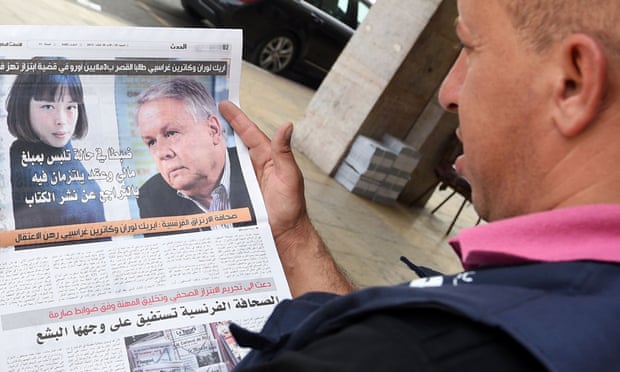French hacks in court over Moroccan king book bribe

Moroccan King Mohammed VI flanked by the crown prince Moulay Hassan back waves to the crowd as he arrives to the the opening session in the Morocco Parliament in Rabat, on Friday, Oct. 12, 2018. King Mohamed VI outlined policies for the new parliamentary session. (AP Photo/Abdeljalil Bounhar)
Concurrent to the bribery scandal which has hit the European parliament and implicated Morocco, a trial involving two French writers in France has kicked off which accuses them off extracting a bribe from the Moroccan royal family in exchange for not publishing a scandalous book about the King.
Two French journalists are on trial in France on charges of trying to blackmail the king of Morocco over allegedly demanding money to hush purportedly damaging revelations about him, an AFP reporter said.
At first glance, the case looks like revenge from the Moroccan elite against the two journalists who had previously published a book which is reported to have embarrassed the king and so a trap was set for them to fall into.
Journalists Eric Laurent, 75, and Catherine Graciet, 48, are accused of demanding 2 million euros ($2 million) in 2015 in exchange for halting the publication of a book about the Moroccan royal family, according to AFP which is following the case which began on January 16th.
READ As Morocco’s relations with Paris tumble, Algeria’s climb
Both writers, who face up to five years in jail and 75,000 euros in fines if found guilty, have denied any wrongdoing and said they fell into a “trap”.
The writers had already published a highly critical book on King Mohammed VI in 2012 titled “The Predator King”, which was banned in Morocco.
Ahead of the planned publication of a second volume, Laurent in August 2015 met a lawyer representing the monarchy at the bar of a Parisian hotel, and warned him it contained potentially embarrassing revelations for the monarchy.
On July 23, 2015, Éric Laurent is said to have contacted the private secretariat of the King of Morocco to request an appointment, organized on August 11 in a Parisian palace with an emissary of the monarchy, the lawyer Hicham Naciri.
“I describe the contents of the book to him”, which plans to evoke tensions in the royal family and accusations of financial embezzlement involving public companies in the country, says Éric Laurent, seated on a chair at the bar of the court.
“Me Naciri said to me: all that does not suit us, and very quickly we switch to a transaction. He is the one who proposes”, he says. _”_ That’s not how it happened,” replies Ralph Boussier, one of the lawyers for the Moroccan state, for whom it is indeed Mr Laurent who “referred to an arrangement” .
The book project “never existed, they have no element to write it (…) The revelations that will shake the kingdom of Morocco: where are they? There is nothing”, he argues, believing that the two journalists saw in an attempt at blackmail “an opportunity” to “change your life”.

Morocco accuses the journalist of offering to halt the book’s publication, originally due in early 2016, in exchange for 3 million euros. He allegedly later reduced that amount to 2 million following negotiations.
But Laurent says the lawyer representing the Moroccan royal family was the one who suggested a financial deal to prevent the information from getting out.
After the first meeting, Morocco filed a complaint and an investigation was opened in Paris.
This time under police surveillance, the lawyer and Laurent then met again at the same hotel later that same month.
They met a third time in late August 2015 at another hotel, where they were joined by co-author Graciet and both writers purportedly signed a deal to receive 2 million euros in exchange for not bringing out the book.
READ Zaid M. Belbagi: Morocco leads Arab world on climate change
They were arrested afterwards in the possession of two envelopes each containing 40,000 euros in cash, which Morocco has claimed was the first installment of the agreed larger sum.
During the investigation, both writers admitted to have agreed to a deal to halt the book’s publication over geopolitical concerns, but denied the charge of blackmail.
Laurent’s lawyer, Serge Portelli, has said both journalists fell into a “trap set up by the Moroccan services”.
Graciet’s lawyer, Eric Moutet, said she had “not taken part in any blackmail”, and considered herself to have been “the victim of a trap”.
Want to chase the pulse of North Africa?
Subscribe to receive our FREE weekly PDF magazine














